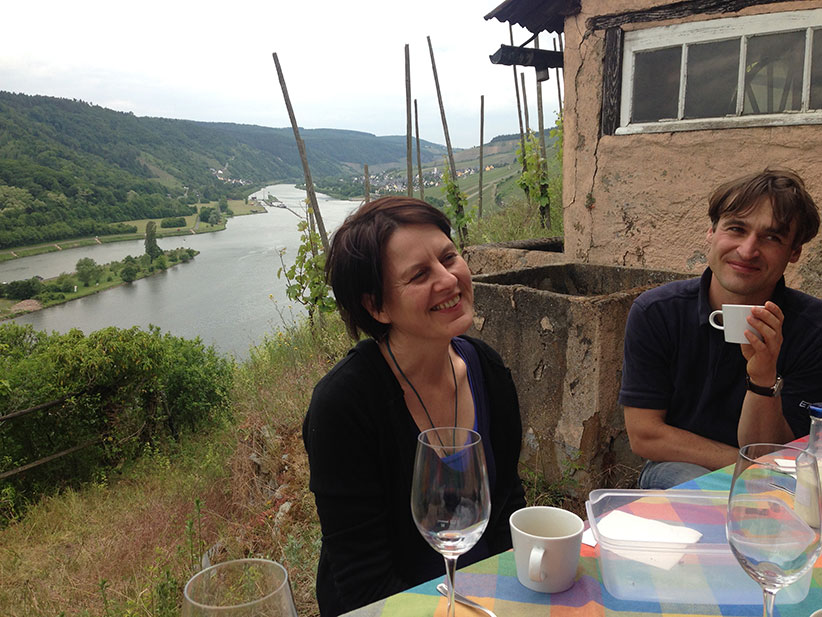
Let’s begin at the beginning.
The husband-and-wife team of Konstantin Weiser and Alexandra Künstler are perhaps the ultimate winemaker’s winemakers.
I have never come across any estate, famous or not, that has expressed anything but awe for what these two do, which is, in short, the following: They farm some of the oldest vines, organically (certified), in the steepest slopes, where there can be no mechanization, in a very wet and humid place, receiving meager yields because of the extreme age of the vines, but also making dazzlingly complex wines that are always delicious but rarely particularly easy.
Many of their bottlings remind me less of wine and more of wildly delicate distillates (with ABVs of 10% or less!) or of very complex spring waters. There is fruit present, especially in the Kabinetts and sweeter Prädikat wines, but even here it is often phenolic – not green apple, but green apple skin, not peach, but peach pith.
Their style is one of the most singular, most unique in the Mosel. These are wines of the earth in a ways that are rarely presented so unadulterated.
I have the sense they could get better scores and more attention making easier, fruitier wines. But they make the wines they want to drink, as do most of the greats.
Vintage 2023 is at Weiser-Künstler something of a dream, the wines are airy and intense yet not sharp; all the edges have been smoothly polished. They seem to be among the most friendly of Wei-Kü’s more recent vintages, something like the energetic 2020ers yet with more intensity and complexity.
These wines are gems, rare and beautiful.
If they are priced incredibly well for what they are (which is among the greatest wines of the Mosel), the only real restriction is quantity.
The Feinherb is without question the most forward and approachable I’ve ever had from them, though keep in mind this wine is also tart and salty.
The village-level dry Trarbacher is a serious wine, salty and smoky and full of green herbs and zest. It feels like the sharper, saline edge of a Muscadet. I love the directness, the almost rustic linear punch of the wine.
The Gaispfad Kabinett Trocken is for me one of the diminutive masterpieces of the Mosel. This wine and Stein’s Palmberg Kabinett Trocken are the two wines that made me realize the greatness of this genre. For me the Gaispfad Kabinett Trocken always tastes like iron and thyme. The 23 edition is airy and intense.
The Steffensberg “im Löwenbaum” Feinherb is their most curious wine, rounder and with more depth, in reality a Spätlese that is fermented almost dry so that the moderate creaminess of the palate is countered by a nearly dry, phenolic grip – the 23 version is lovely, both generous and tart.
When we are talking Kabinetts, the three lineup with their own personalities. The Schlossberg is for me always the lightest and zippiest; it is immediate pleasure. The Sonnenlay is the most elegant, reminding me a bit of the form of a classic middle Mosel Kabinett. The Ellergrub is the masterpiece, the most mineral and dense, the most structured. It’s I’d say the most complex and normally the toughest of the Kabinetts, though it’s relatively energetic and expressive in 23.
The higher-level Prädikats from Wei-Kü in 2023 are delicious and rare. There is a tiny bit of Ellergrub Spätlese for the U.S. and about half as much Auslese GK. Both are stellar; you can taste the love that Wei-Kü has for these genres.
Finally, being released with roughly two years of bottle age a superb 2022 Sekt Brut Nature comes to market. Their sparkling style is direct and zippy, less brioche and biscuit and more salt, dried herbs and lemon zest. For purists, they are a delight, the salty cut of their best dry wines being even further enlivened by the bubbles.